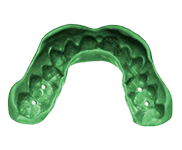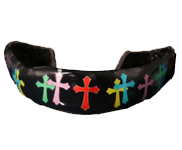Mouthguard Facts
When it comes to sports-related dental injuries, it is all about PREVENTION. An accurately diagnosed, designed and custom fabricated mouthguard is essential for the prevention of orofacial injuries. Well-fitted mouthguards prevent severely damaging impact between the upper and lower teeth., which can, also, result in damage to soft tissues, such as the lips, cheeks, and tongue.
There are three main types of mouthguards: Custom, Boil and Bite, or Stock.
Stock:
- Offer the least protection
- Least expensive
- No adjustments for fit
- Limited size options
- Not considered acceptable as facial device
- Can be uncomfortable
- Often must be clenched to stay in (stresses jaws and teeth)
- Can cause difficulty breathing and speaking

Boil and Bite:
- Minimal protection
- Relatively inexpensive
- Lack proper extensions
- Most do not cover all teeth as needed
- Often bulky and loses it shape quickly
- Poor retention and poor fit
- Can cause difficulty breathing and speaking

Custom-made:
- MAXIMUM PROTECTION
- Take age and sport of child into account when fabricating
- Comfortable to wear
- Most retentive
- Allow natural airflow for breathing and speech
- Proper thickness for protection
- Covers all teeth and fills space between cheeks and gums
- Resistant to tears and resilient material utilized

REMEMBER: DAMAGED TEETH DO NOT GROW BACK. PROTECT THAT POWERSMILE!!
How do custom-made mouthguards protect you???
Mouthguards are made of strong flexible materials that are designed to protect your teeth, gums, and jaw in cases of impact. There are 3 main ways that mouthguards provide protection.
- 1. Absorb force
- Any impact to the face or jaw involves force. A mouthguard absorbs some of the energy, ensuring the potential harm bye the impact is limited.
- Helps prevent teeth from being slammed together because of its cushioning effect.
- Helps prevent serious head injuries, such as jaw fractures.
- 2. Prevent broken teeth
- A properly fitted mouthguard will distribute any energy directed at the teeth.
- For example, if you get hit in the mouth by a baseball, a proper mouthguard will spread out the effect of the impact so that a single tooth does not take the full blunt of the hit.
- 3. Stop lip and tongue injuries
- Covers upper teeth completely and creates a functional barrier between the teeth and rest of mouth.
- Decreases likelihood of lip and tongues injuries by making it harder for your teeth to cut your lip or bite your tongue.
“The right mouthguard can make all the difference!”
References:
- American Dental Association
- Journal of the American Dental Association
- American Academy of Pediatric Dentistry
- Clinical Journal of Sports Medicine
- Academy of General Dentistry
- National Youth Sports Foundation for Safety
- Center for Disease Control
